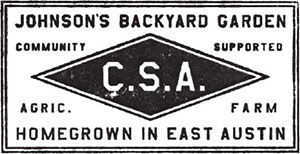
CSA MEMBER SPOTLIGHT: CAMERON ALLEN
02/10/17 — Heydon Hatcher
A very happy Friday to all of you! It’s an especially happy Friday because... we’re back with another CSA Member Spotlight! It’s been quite awhile since we’ve taken a closer look at the amazing community that we've cultivated around our CSA. We hope that this series will highlight the diverse nature and composition of this community, and how each member integrates the CSA into their varied and oftentimes bustling lifestyles. This week, we caught Cameron Allen, the immensely passionate and engaging founder of The SEED, a democracy-based ESL program based in Southeast Austin.
On a dreary Monday afternoon, Cameron welcomed us into his bright and lively Eastside home after a morning of teaching. We caught him in the midst of a quiet moment, feeding his sprightly 16-month old daughter, Truett, her afternoon snack. Peppered with art, family photographs, toys, and trinkets, the Allen’s home is an undeniably welcoming one, reflecting these amazingly kind and warm people. Read the interview below:
![170206_SDG310921]() Cameron and Truett enjoying oranges from their orange tree. Photo by Scott David Gordon.
Cameron and Truett enjoying oranges from their orange tree. Photo by Scott David Gordon.
How long have you been a CSA member? We started back in 2011. We took a break when I went to grad school, then came back. So maybe 4 or 5 years total.
How did you hear about the CSA? The concept of Community Supported Agriculture is something I had heard of before, just through having friends who are interested in food and farming, and had been involved in Portland and other parts of the US before I really started to pay much attention to CSAs.
I found out about Johnson’s Backyard Garden at farmers markets, and from there did a little research on different CSAs available in Austin. Y’all’s just seemed like the best… offering tons of weeks and such a diverse spread of veggies was a super attractive thing for us.
When you get your CSA box, what’s your standard plan of action? Truett and I walk to pick our share up right down here at SkyCandy (just right down the street). Then, we just take a walk and snack on things, try stuff… so, that’s actually the first thing. Then we get home and I spearhead getting stuff in and out of the fridge.
One of my goals is to figure out what to do with everything that’s already in the fridge before I unload anything new. So, getting in and digging out stuff that is already in there and incorporating it into something edible, whether it’s for Truett or us.
![Cameron Allen. Photo by Scott David Gordon.]() Cameron Allen. Photo by Scott David Gordon.
Cameron Allen. Photo by Scott David Gordon.
What makes the CSA worth it for you? For me, it’s a fun challenge to get produce that I’m not familiar with… I’ve tried to garden for a long time, not so much at this house and with Truett (it’s kind of tough), but I’ve always grown stuff. I was always kind of weird about eating it though because it’s either not big enough, or just an odd quantity… like 3 pieces of okra. The cool thing about the CSA is that it’s enough quantity that the veggies can actually be the foundation of the food that we are eating. Rather than us just eating something normal, like pizza, and I’m just adding extra something to the salad. I like that because it’s a challenge. I like the idea of pushing ourselves to think more about seasonality, too. It seems like an interesting thing to keep thinking about…
What is your favorite veggie? I really like the black radishes, those are really nice. I like the radishes, in general, a lot. Watermelon radishes are a lot of fun. I also like regular green cabbage because there’s a lot of fun stuff to do with that. Man, that’s really tough though… then, of course, the greens are fun… I love collard greens and kale.
What’s your favorite recipe? So, we do a lot of big approximations of Asian soups. Not a specific cuisine, but just Asian inspired in the ingredients that we include in the meals… you know, radish, daikon, miso, and udon noodles. That’s nice because it can be whatever you want. It can be as brothy as you want, and you can add tons of fresh stuff like herbs, green onions, and you can just toss in radishes raw. That’s one that we go to a lot with our CSA because it can be really well rounded and we can toss in tofu protein, too!
![unnamed-1]() An Allen Asian soup concoction.
An Allen Asian soup concoction.
What is the vegetable that stumps you the most? Well the funny thing is that we have Truett, so whatever we aren’t using we can incorporate into what she’s consuming (not in a sneaky way). Dandelion greens are really tricky for us. I usually just saute the crap out of them with a lot of garlic. Sometimes the herbs don’t feel right, like, I just don’t want to eat a bunch of dill. I can always eat basil and cilantro, though. Fennel is a rough one for us, because we try to eat the whole thing. I’m not always creative enough for that, though. We’re getting there though, having been a part of the CSA for a while, now we’re recognizing the patterns of what we’re getting. It’s not like you just have 3 bulbs of fennel and then you are done with it, you know it’s coming back! So you might as well figure out what to do with those tough ingredients because it’ll be gracing the CSA again next year. It’s hard to find a partner food for fennel, that veggie interacts so strangely with other foods. It just doesn’t seem to go with the right stuff… kind of throws everything else off. We juice it sometimes, though! We drink our fennel.
Do you and your family adhere to a special diet? I’m vegan. I eat goldfish now though, especially the ones that Truett leaves trailing behind her on the floor. I’ve been vegan for about 8 years. My wife is pescatarian, she’s from Louisiana, so, she eats fish from time to time. We don’t cook fish here at the house just because I’m the one who cooks and I don’t want to do that!
As for our daughter, she comes to school with me every morning. I teach at an adult education program that we started (more on that later!). The people that I work with are mainly from Mexico and Central America, so they’ll bring chicharones and all manner of wild stuff to eat. She’s has a lot of secrets… I teach on one side and she’s other the other side of the building with all the kiddos. She’s in there walking around and grabbing stuff off of people’s plates. But when we are at home, she’s pretty much vegan.
![Cookin' time. Photo by Scott David Gordon.]() Cookin' time. Photo by Scott David Gordon.
Cookin' time. Photo by Scott David Gordon.
Where did you learn to cook? I became vegetarian when I was 17, and my parents were not at all interested in that. I was doing a lot of cooking for myself back then, and since then have just kept it up. I watch a lot of youtube to learn about foods, and not necessarily just vegan foods, that seems so limiting. I just practice a lot! The nice thing about getting a big load of vegetables that you aren’t super familiar with is that you have to figure out something to do with them. I enjoy making comparisons of things like turnip, radish, rutabaga, kohlrabi, so that you can substitute and not totally ruin the recipe. I do a lot of youtubing and improvisation.
What’s your favorite kitchen gadget? The juicer! We also have a Blendtec blender that I use all the time for sauces, soups, salsas, and cashew cheeses! Those are fun. I just found a sauerkraut crock, so that’s exciting! I don’t know if anyone else is, but I am certainly psyched about it. If I can get my fermentation game on point, then I could ferment all types of stuff. My wife has no sense of smell, so if there was some big sauerkraut stink in the house, she would be none the wiser.
![Family tintype. Photo by Scott David Gordon.]() Family tintype. Photo by Scott David Gordon.
Family tintype. Photo by Scott David Gordon.
What are you cooking now? I’ve been cooking a lot of fun stuff for Truett. We have these little squeezy packs that you can prepare by blending something up and squeezing soft food into it, then we can just put a little lid on it for her. So we were combining sweet potatoes, pears, and apples… and tons of things. She’s all of the sudden not very interested in it! It’s baby food, and she doesn’t think that she’s a baby anymore. Now she wants to grab onto stuff and hold things. I’ve been doing a lot of mac and cheese where the sauce is made with carrots and potatoes. It’s super simple and she loves it. There’s a kale salad that we make with sweet potatoes that is really nice… Recently, with the cold weather, a lot of soups. Tons of huge soups. I really love Vietnamese food, a lot of fresh herbs and a lot of spice.
My favorite recipe by far is scallion noodles. When you make a scallion oil, you cook a whole handful of scallions in vegetable oil for like half an hour until they are brown and crispy. Mix dark soy sauce, regular soy sauce, and a little bit of sugar, and that makes this really thick, black mixture. Put the the scallion oil in it, and then pour the combined sauces on top of some udon noodles or whatever noodles you prefer. It’s so insanely good... I could eat that forever. We’ll throw beet greens, beets, or cabbage in there, too. When I’m running around with her, it only takes a little while to make, and then I’m set.
![Kitchen chalkboard. Photo by Scott David Gordon.]() Kitchen chalkboard. Photo by Scott David Gordon.
Kitchen chalkboard. Photo by Scott David Gordon.
Do you have any advice for new CSA members? Eat everything! Like carrot tops and beet greens… that’s probably the most important thing. Don’t assume that you aren’t going to like something… just eat all of it. You’ll find out what works and what doesn’t. Also, recognize that if there isn’t a deep tradition of eating certain vegetables here, there is probably somewhere else in the world that utilizes certain vegetables often in their cuisine. For example, radishes are utilized beautifully in Japanese food… so if you can figure out how Japanese folks eat radishes, maybe there’s a recipe there that you can tap into. Basically, just building from the ingredients. There’s a millenia of cooking that has preceded us that is available for us to use.
When you aren’t gushing over your CSA share, what do you do? I’m a full-time dad, and I spend a lot of time on my program, The SEED, the one that we built. I’m the only member of our small community that is a native English speaker, so all my partners come to me to learn English. The SEED is about democracy and building leadership within the program as opposed to me telling them what to do. I spend a lot of time trying to figure that out - planning events and curriculum. I’m also trying to read as much as I can. Our goal at the program is read a million words this year in English, which is everyone’s second or third language. That’s our main focus. I’m trying to show them that I’m not just telling them to do something that I myself am not willing to do. So I’ve been more focused on reading than ever before. That’s been a lot of fun.
![The SEED reads. Photo courtesy of The SEED website.]() The SEED reads. Photo courtesy of The SEED website.
The SEED reads. Photo courtesy of The SEED website.
Can you tell us about your program, The SEED? Sure! I worked at Youthworks, which is an organization in Southeast Austin, off of Woodward and 35. I was the adult head coordinator for around four years. I taught ESL to adults, and after being there for a few years, we built a really strong community there. It was a very powerful family group of about 60 or 70 people. However, I was not finding the critical dialogues that I was interested in having especially about adult education, trainings, and professional development around Texas. So I thought to myself that I needed to go to grad school because that’s where these things that I sought were happening. Also, I needed to figure out if there are people out there doing critical research on the things that I care about in adult education. So, I went to grad school and was there for nine months, finished my Masters and came back with the expressed goal of coming back stealing the program and my people from Youthworks.
As it turns out, when I returned, YW helped us out the door, which worked out really nicely. Except that we were this group of really excited, passionate people with no money, no reputation, no organizational identity, and no structures or policies… Just a group of really amazing folks, the majority of whom were English language learners with some volunteers and a teachers that I know. That was in 2014. We found a space through a partnership with Mendez Middle School, and we were there for a couple days a week for a little while. The year after, which was last school year, we moved to Houston Elementary.
![The SEED Community cooking for Thanksgiving last year.]() The SEED Community cooking for Thanksgiving last year.
The SEED Community cooking for Thanksgiving last year.
Long story short, we are essentially a foundational ESL program for adults. The people that we work with are moms, dads, cousins, brothers, sisters, they are attached people. Specifically as parents, grandparents, and caretakers of young children, that’s why the kids come to our program as well. One side of the portal you have the kids, and the other side you have their parents, along with other community members who don’t have kids below the age of 5. So, mom and dad can focus on English language learning and literacy, while the kids are in the children’s space romping around with each other, learning songs, and working on other educational activities.
The difference between us and most other communities is that our focus is bringing democracy into every step of the process. So, everywhere from logo design to fundraising to location to partnerships to schedules… everything is on the table. My goal is not only to facilitate a dialogue between these wonderful people and the world in which they live and the worlds that they create, but also through language… to benefit them in their language study, but also empower them as active leaders within the program which will in turn empower them outside of the program. Our program can be challenging when it needs to be challenging, it can be safe when it needs to be safe, but we can mediate their world outside with our world inside at The SEED. Through language study, we are coming to terms with ourselves in the context of others, we’re coming to terms with ourselves as the shapers of our realities, and trying to figure out the ways that those realities can and cannot coexist. When they find conflict, trying to figure out how to address it. The SEED is deeply rooted in social justice, not by just talking about MLK, white supremacy, or xenophobic Islamophobes… though, we definitely DO talk about those things, but the way in which we facilitate that conversation is with social justice pedagogy. It’s not just me coming in and dictating to the community, it’s more of an inquiry based approach. It’s about us thinking about what’s important, the state of the world in which we are living, and how something ought to be different in certain ways. I’m trying to decentralize myself as the sole person with power in terms of curriculum, content, schedule, and the whole thing. It’s fun and tiring, but we are an awesome place to be! People just keep coming, which is really nice. That’s the SEED in a nutshell!
![The SEED Community. Photo from The SEED Facebook.]() The SEED Community. Photo from The SEED Facebook.
The SEED Community. Photo from The SEED Facebook.
Finally, if you were on a stranded island, what three things would you bring?![The Allen family. Photo by Scott David Gordon.]() The Allen family. Photo by Scott David Gordon.
The Allen family. Photo by Scott David Gordon.
A huge thanks to Cameron and his family for their continued support of the farm, allowing us to feature them, and for being such strong forces of good in our community! ‘Til next time!
On a dreary Monday afternoon, Cameron welcomed us into his bright and lively Eastside home after a morning of teaching. We caught him in the midst of a quiet moment, feeding his sprightly 16-month old daughter, Truett, her afternoon snack. Peppered with art, family photographs, toys, and trinkets, the Allen’s home is an undeniably welcoming one, reflecting these amazingly kind and warm people. Read the interview below:
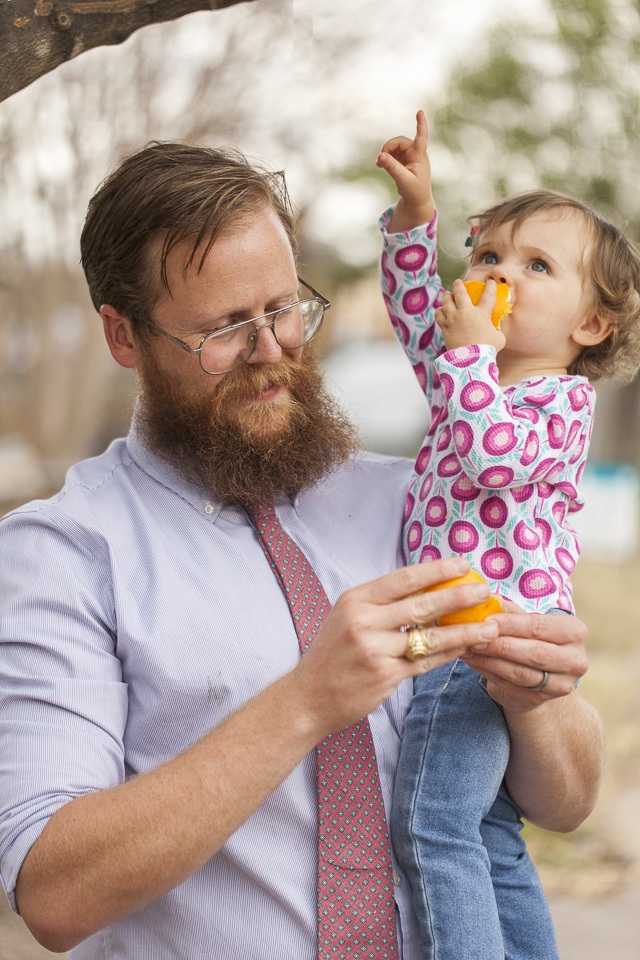 Cameron and Truett enjoying oranges from their orange tree. Photo by Scott David Gordon.
Cameron and Truett enjoying oranges from their orange tree. Photo by Scott David Gordon.
How long have you been a CSA member? We started back in 2011. We took a break when I went to grad school, then came back. So maybe 4 or 5 years total.
How did you hear about the CSA? The concept of Community Supported Agriculture is something I had heard of before, just through having friends who are interested in food and farming, and had been involved in Portland and other parts of the US before I really started to pay much attention to CSAs.
I found out about Johnson’s Backyard Garden at farmers markets, and from there did a little research on different CSAs available in Austin. Y’all’s just seemed like the best… offering tons of weeks and such a diverse spread of veggies was a super attractive thing for us.
When you get your CSA box, what’s your standard plan of action? Truett and I walk to pick our share up right down here at SkyCandy (just right down the street). Then, we just take a walk and snack on things, try stuff… so, that’s actually the first thing. Then we get home and I spearhead getting stuff in and out of the fridge.
One of my goals is to figure out what to do with everything that’s already in the fridge before I unload anything new. So, getting in and digging out stuff that is already in there and incorporating it into something edible, whether it’s for Truett or us.
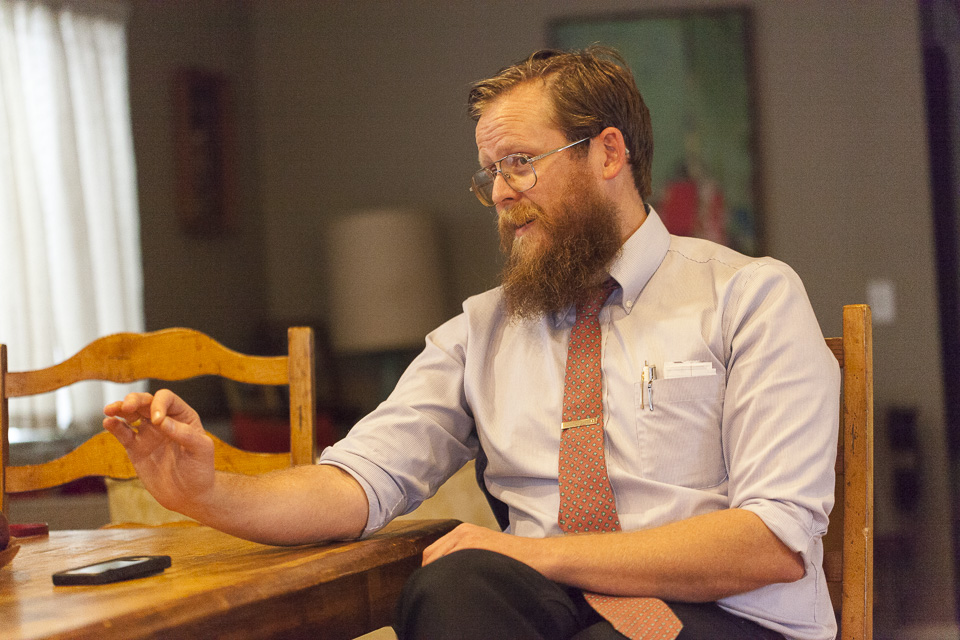 Cameron Allen. Photo by Scott David Gordon.
Cameron Allen. Photo by Scott David Gordon.
What makes the CSA worth it for you? For me, it’s a fun challenge to get produce that I’m not familiar with… I’ve tried to garden for a long time, not so much at this house and with Truett (it’s kind of tough), but I’ve always grown stuff. I was always kind of weird about eating it though because it’s either not big enough, or just an odd quantity… like 3 pieces of okra. The cool thing about the CSA is that it’s enough quantity that the veggies can actually be the foundation of the food that we are eating. Rather than us just eating something normal, like pizza, and I’m just adding extra something to the salad. I like that because it’s a challenge. I like the idea of pushing ourselves to think more about seasonality, too. It seems like an interesting thing to keep thinking about…
What is your favorite veggie? I really like the black radishes, those are really nice. I like the radishes, in general, a lot. Watermelon radishes are a lot of fun. I also like regular green cabbage because there’s a lot of fun stuff to do with that. Man, that’s really tough though… then, of course, the greens are fun… I love collard greens and kale.
What’s your favorite recipe? So, we do a lot of big approximations of Asian soups. Not a specific cuisine, but just Asian inspired in the ingredients that we include in the meals… you know, radish, daikon, miso, and udon noodles. That’s nice because it can be whatever you want. It can be as brothy as you want, and you can add tons of fresh stuff like herbs, green onions, and you can just toss in radishes raw. That’s one that we go to a lot with our CSA because it can be really well rounded and we can toss in tofu protein, too!
 An Allen Asian soup concoction.
An Allen Asian soup concoction.
What is the vegetable that stumps you the most? Well the funny thing is that we have Truett, so whatever we aren’t using we can incorporate into what she’s consuming (not in a sneaky way). Dandelion greens are really tricky for us. I usually just saute the crap out of them with a lot of garlic. Sometimes the herbs don’t feel right, like, I just don’t want to eat a bunch of dill. I can always eat basil and cilantro, though. Fennel is a rough one for us, because we try to eat the whole thing. I’m not always creative enough for that, though. We’re getting there though, having been a part of the CSA for a while, now we’re recognizing the patterns of what we’re getting. It’s not like you just have 3 bulbs of fennel and then you are done with it, you know it’s coming back! So you might as well figure out what to do with those tough ingredients because it’ll be gracing the CSA again next year. It’s hard to find a partner food for fennel, that veggie interacts so strangely with other foods. It just doesn’t seem to go with the right stuff… kind of throws everything else off. We juice it sometimes, though! We drink our fennel.
Do you and your family adhere to a special diet? I’m vegan. I eat goldfish now though, especially the ones that Truett leaves trailing behind her on the floor. I’ve been vegan for about 8 years. My wife is pescatarian, she’s from Louisiana, so, she eats fish from time to time. We don’t cook fish here at the house just because I’m the one who cooks and I don’t want to do that!
As for our daughter, she comes to school with me every morning. I teach at an adult education program that we started (more on that later!). The people that I work with are mainly from Mexico and Central America, so they’ll bring chicharones and all manner of wild stuff to eat. She’s has a lot of secrets… I teach on one side and she’s other the other side of the building with all the kiddos. She’s in there walking around and grabbing stuff off of people’s plates. But when we are at home, she’s pretty much vegan.
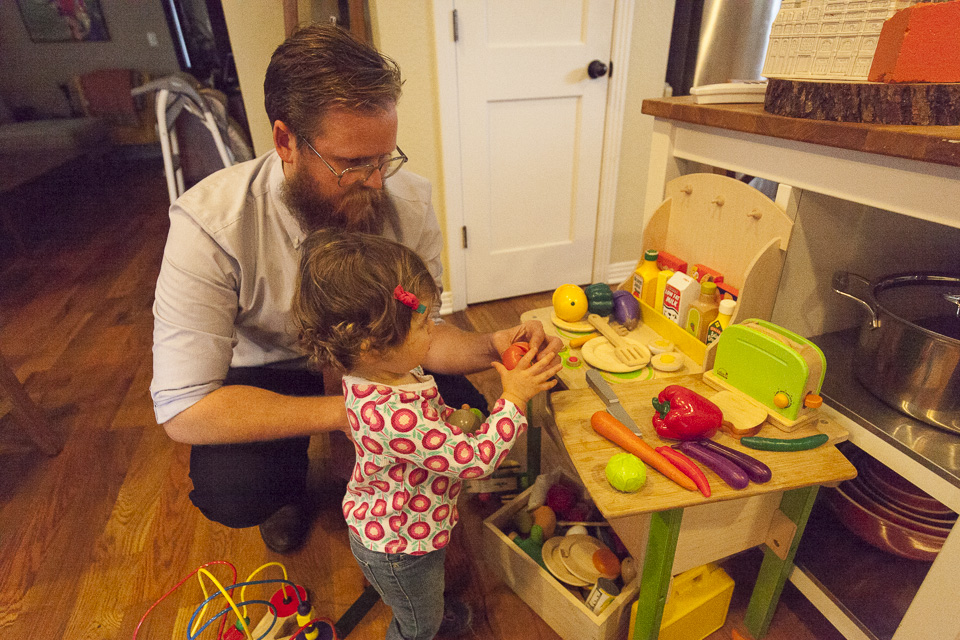 Cookin' time. Photo by Scott David Gordon.
Cookin' time. Photo by Scott David Gordon.
Where did you learn to cook? I became vegetarian when I was 17, and my parents were not at all interested in that. I was doing a lot of cooking for myself back then, and since then have just kept it up. I watch a lot of youtube to learn about foods, and not necessarily just vegan foods, that seems so limiting. I just practice a lot! The nice thing about getting a big load of vegetables that you aren’t super familiar with is that you have to figure out something to do with them. I enjoy making comparisons of things like turnip, radish, rutabaga, kohlrabi, so that you can substitute and not totally ruin the recipe. I do a lot of youtubing and improvisation.
What’s your favorite kitchen gadget? The juicer! We also have a Blendtec blender that I use all the time for sauces, soups, salsas, and cashew cheeses! Those are fun. I just found a sauerkraut crock, so that’s exciting! I don’t know if anyone else is, but I am certainly psyched about it. If I can get my fermentation game on point, then I could ferment all types of stuff. My wife has no sense of smell, so if there was some big sauerkraut stink in the house, she would be none the wiser.
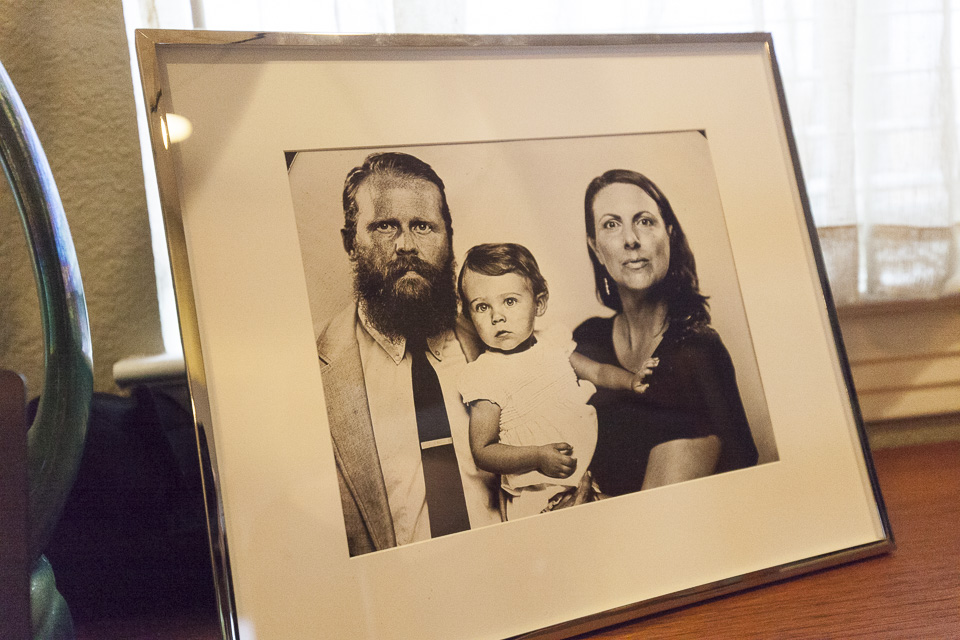 Family tintype. Photo by Scott David Gordon.
Family tintype. Photo by Scott David Gordon.
What are you cooking now? I’ve been cooking a lot of fun stuff for Truett. We have these little squeezy packs that you can prepare by blending something up and squeezing soft food into it, then we can just put a little lid on it for her. So we were combining sweet potatoes, pears, and apples… and tons of things. She’s all of the sudden not very interested in it! It’s baby food, and she doesn’t think that she’s a baby anymore. Now she wants to grab onto stuff and hold things. I’ve been doing a lot of mac and cheese where the sauce is made with carrots and potatoes. It’s super simple and she loves it. There’s a kale salad that we make with sweet potatoes that is really nice… Recently, with the cold weather, a lot of soups. Tons of huge soups. I really love Vietnamese food, a lot of fresh herbs and a lot of spice.
My favorite recipe by far is scallion noodles. When you make a scallion oil, you cook a whole handful of scallions in vegetable oil for like half an hour until they are brown and crispy. Mix dark soy sauce, regular soy sauce, and a little bit of sugar, and that makes this really thick, black mixture. Put the the scallion oil in it, and then pour the combined sauces on top of some udon noodles or whatever noodles you prefer. It’s so insanely good... I could eat that forever. We’ll throw beet greens, beets, or cabbage in there, too. When I’m running around with her, it only takes a little while to make, and then I’m set.
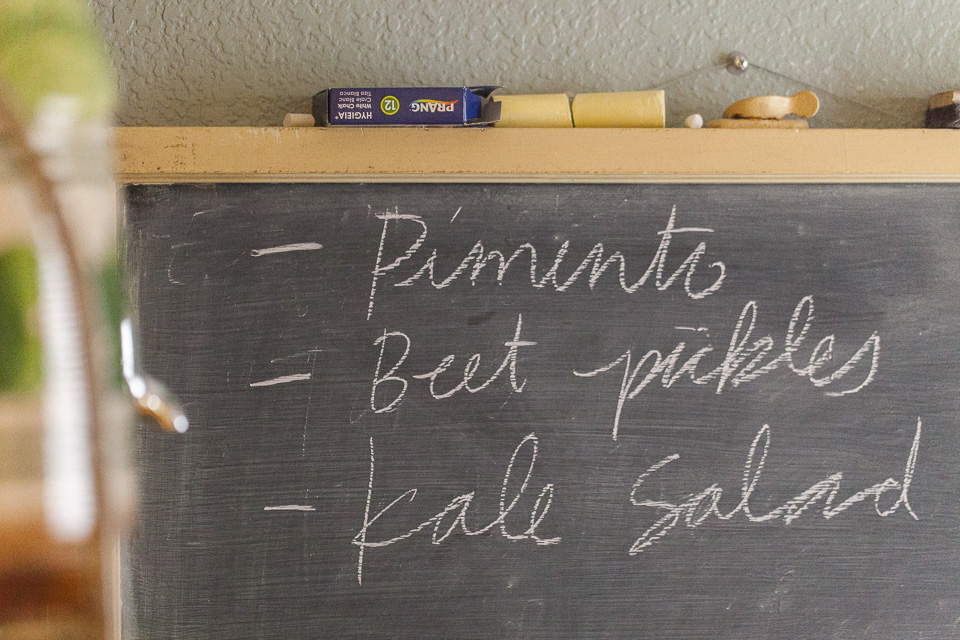 Kitchen chalkboard. Photo by Scott David Gordon.
Kitchen chalkboard. Photo by Scott David Gordon.
Do you have any advice for new CSA members? Eat everything! Like carrot tops and beet greens… that’s probably the most important thing. Don’t assume that you aren’t going to like something… just eat all of it. You’ll find out what works and what doesn’t. Also, recognize that if there isn’t a deep tradition of eating certain vegetables here, there is probably somewhere else in the world that utilizes certain vegetables often in their cuisine. For example, radishes are utilized beautifully in Japanese food… so if you can figure out how Japanese folks eat radishes, maybe there’s a recipe there that you can tap into. Basically, just building from the ingredients. There’s a millenia of cooking that has preceded us that is available for us to use.
When you aren’t gushing over your CSA share, what do you do? I’m a full-time dad, and I spend a lot of time on my program, The SEED, the one that we built. I’m the only member of our small community that is a native English speaker, so all my partners come to me to learn English. The SEED is about democracy and building leadership within the program as opposed to me telling them what to do. I spend a lot of time trying to figure that out - planning events and curriculum. I’m also trying to read as much as I can. Our goal at the program is read a million words this year in English, which is everyone’s second or third language. That’s our main focus. I’m trying to show them that I’m not just telling them to do something that I myself am not willing to do. So I’ve been more focused on reading than ever before. That’s been a lot of fun.
 The SEED reads. Photo courtesy of The SEED website.
The SEED reads. Photo courtesy of The SEED website.
Can you tell us about your program, The SEED? Sure! I worked at Youthworks, which is an organization in Southeast Austin, off of Woodward and 35. I was the adult head coordinator for around four years. I taught ESL to adults, and after being there for a few years, we built a really strong community there. It was a very powerful family group of about 60 or 70 people. However, I was not finding the critical dialogues that I was interested in having especially about adult education, trainings, and professional development around Texas. So I thought to myself that I needed to go to grad school because that’s where these things that I sought were happening. Also, I needed to figure out if there are people out there doing critical research on the things that I care about in adult education. So, I went to grad school and was there for nine months, finished my Masters and came back with the expressed goal of coming back stealing the program and my people from Youthworks.
As it turns out, when I returned, YW helped us out the door, which worked out really nicely. Except that we were this group of really excited, passionate people with no money, no reputation, no organizational identity, and no structures or policies… Just a group of really amazing folks, the majority of whom were English language learners with some volunteers and a teachers that I know. That was in 2014. We found a space through a partnership with Mendez Middle School, and we were there for a couple days a week for a little while. The year after, which was last school year, we moved to Houston Elementary.
 The SEED Community cooking for Thanksgiving last year.
The SEED Community cooking for Thanksgiving last year.
Long story short, we are essentially a foundational ESL program for adults. The people that we work with are moms, dads, cousins, brothers, sisters, they are attached people. Specifically as parents, grandparents, and caretakers of young children, that’s why the kids come to our program as well. One side of the portal you have the kids, and the other side you have their parents, along with other community members who don’t have kids below the age of 5. So, mom and dad can focus on English language learning and literacy, while the kids are in the children’s space romping around with each other, learning songs, and working on other educational activities.
The difference between us and most other communities is that our focus is bringing democracy into every step of the process. So, everywhere from logo design to fundraising to location to partnerships to schedules… everything is on the table. My goal is not only to facilitate a dialogue between these wonderful people and the world in which they live and the worlds that they create, but also through language… to benefit them in their language study, but also empower them as active leaders within the program which will in turn empower them outside of the program. Our program can be challenging when it needs to be challenging, it can be safe when it needs to be safe, but we can mediate their world outside with our world inside at The SEED. Through language study, we are coming to terms with ourselves in the context of others, we’re coming to terms with ourselves as the shapers of our realities, and trying to figure out the ways that those realities can and cannot coexist. When they find conflict, trying to figure out how to address it. The SEED is deeply rooted in social justice, not by just talking about MLK, white supremacy, or xenophobic Islamophobes… though, we definitely DO talk about those things, but the way in which we facilitate that conversation is with social justice pedagogy. It’s not just me coming in and dictating to the community, it’s more of an inquiry based approach. It’s about us thinking about what’s important, the state of the world in which we are living, and how something ought to be different in certain ways. I’m trying to decentralize myself as the sole person with power in terms of curriculum, content, schedule, and the whole thing. It’s fun and tiring, but we are an awesome place to be! People just keep coming, which is really nice. That’s the SEED in a nutshell!
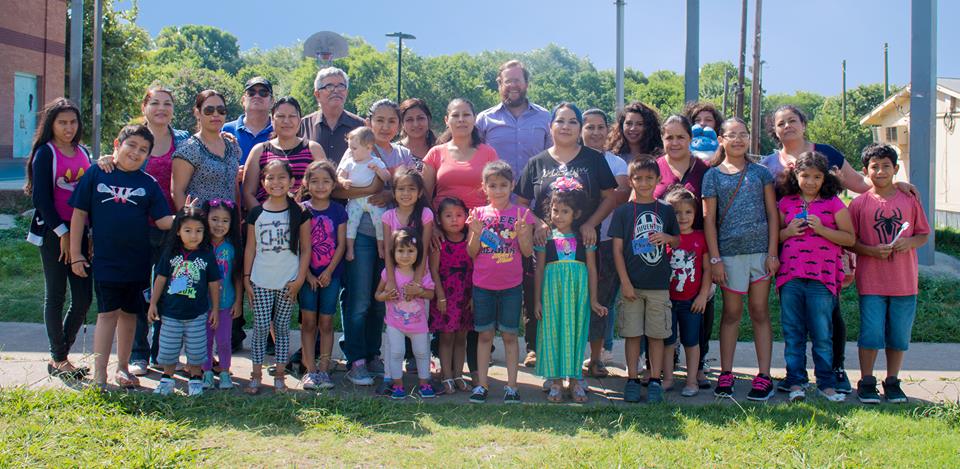 The SEED Community. Photo from The SEED Facebook.
The SEED Community. Photo from The SEED Facebook.
Finally, if you were on a stranded island, what three things would you bring?
- My family unit
- All of the books (a couple thousand)
- A camera
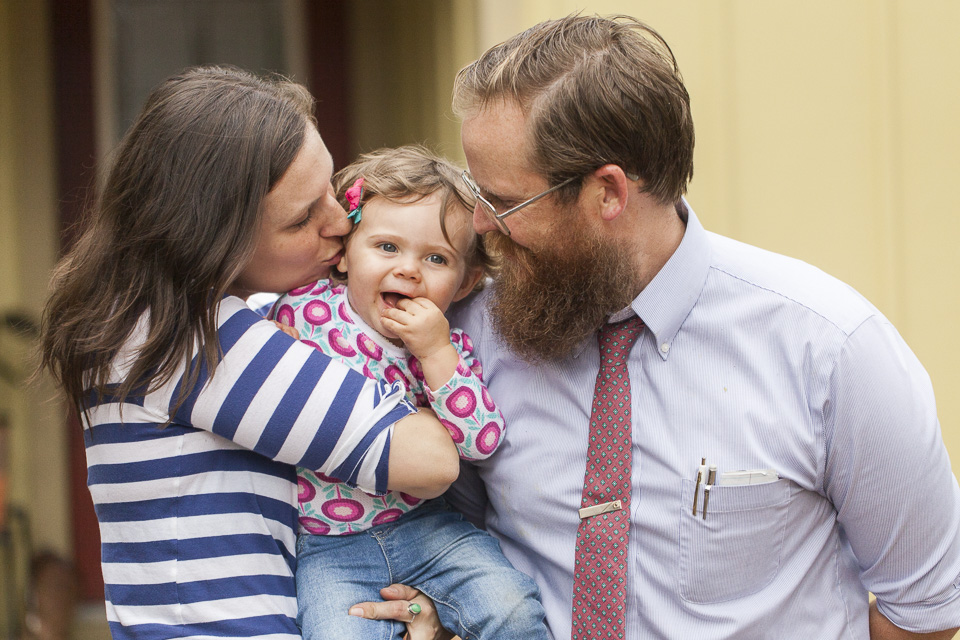 The Allen family. Photo by Scott David Gordon.
The Allen family. Photo by Scott David Gordon.
A huge thanks to Cameron and his family for their continued support of the farm, allowing us to feature them, and for being such strong forces of good in our community! ‘Til next time!






 0 ITEMS IN CART
0 ITEMS IN CART 
